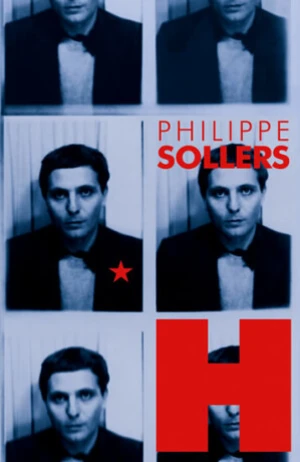Philippe Sollers’ groundbreaking 1973 novel H was inspired by the May 1968 Paris student/worker uprising, and, in its own right, performs a revolt against much that’s been (and still is) taken for granted in the belles lettres. Described as “a music that is inscribed in language, becoming the object of its own reasoning” (Julia Kristeva) and as an “unpunctuated wall of words, an extremely active […] mass of language” (David Hayman), H does away with plot, character and setting–and, on the typographical level, with punctuation, capitalisation, or paragraph breaks–in order to attempt what Sollers himself called “an external polylogue.” The text performs an infinite fragmentation of subjectivity into a polyphony of ventriloquized voices where “words turn round and come back, producing a mater
ial fullness of pleasures” and “everything is organized into a splendid series of irrelevancies” (Roland Barthes). It is this fulness of H, this “suffocation” it produces, that might be, with Barthes, termed its “beauty.” Accommodating a vast range of tonalities, attitudes, modes, and ideologies, H makes a case in point of how a literary work should function according to Sollers: “A work exists by itself only potentially, and its actualization (or production) depends on its readings and on the moments at which these readings actively take place.”
více
Nejlevnější produkt
6,97 € | knihy.abz.cz | In stock
Máte ve vašem obchodě lepší produkt?
Nejlevnější produkt
6,97 € | knihy.abz.cz | In stock
Máte ve vašem obchodě lepší produkt?
K dispozici v
Parametry
Rok vydání
2015 | 2011 - 2020
Co říkají obchody
knihy.abz.cz
Kniha: H; Autor: Sollers Philippe; Philippe Sollers’ groundbreaking 1973 novel H was inspired by the May 1968 Paris student/worker uprising, and, in its own right, performs a revolt against much that’s been (and still is) taken for granted in the belles lettres. Described as ...
Knihy Dobrovsky
Philippe Sollers’ groundbreaking 1973 novel H was inspired by the May 1968 Paris student/worker uprising, and, in its own right, performs a revolt against much that’s been (and still is) taken for granted in the belles lettres. Described as “a music that is inscribed in language, becoming the object of its own reasoning” (Julia Kristeva) and as an “unpunctuated wall of words, an extremely active […] mass of language” (David Hayman), H does away with plot, character and setting–and, on the typographical level, with punctuation, capitalisation, or paragraph breaks–in order to attempt what Sollers himself called “an external polylogue.” The text performs an infinite fragmentation of subjectivity into a polyphony of ventriloquized voices where “words turn round and come back, producing a material fullness of pleasures” and “everything is organized into a splendid series of irrelevancies” (Roland Barthes). It is this fulness of H, this “suffocation” it produces, that might be, with Barthes, termed its “beauty.” Accommodating a vast range of tonalities, attitudes, modes, and ideologies, H makes a case in point of how a literary work should function according to Sollers: “A work exists by itself only potentially, and its actualization (or production) depends on its readings and on the moments at which these readings actively take place.”


